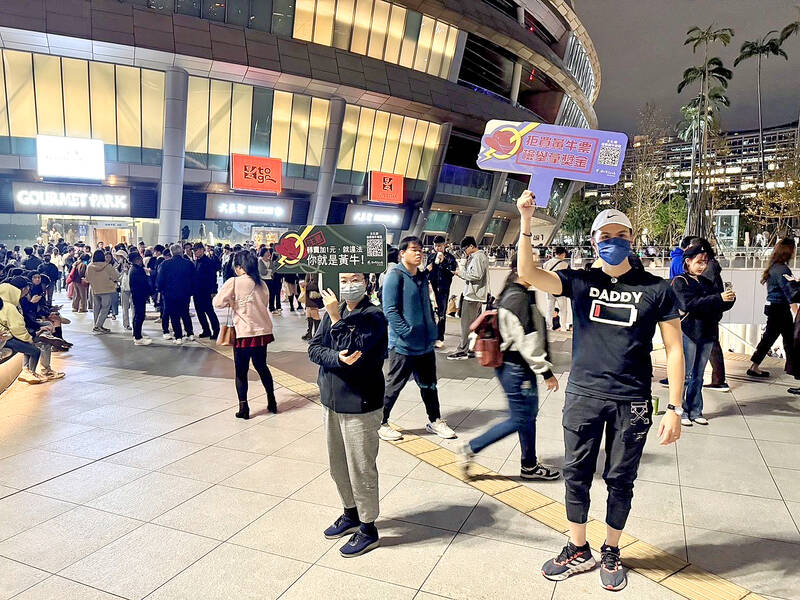Taipei prosecutors yesterday indicted 11 people on charges of scalping tickets, making an estimated NT$43.54 million (US$1.33 million) in illegal proceeds over eight years in what they say is the largest scalping group ever identified in Taiwan.
According to the indictment, the alleged leaders of the group, a couple surnamed Liu (劉) and Chang (張), had been involved in ticket scalping since 2016 and created a business around the act.
The group had dedicated agents who registered on ticketing Web sites using stolen IDs, it said.

Photo courtesy of the Taipei Department of Cultural Affairs
The agents allegedly used algorithms to help them quickly reserve large numbers of tickets.
The algorithm was capable of logging in with hundreds of accounts simultaneously and was able to bypass limits of two to four tickets per member, prosecutors said.
The algorithms automatically input information, could crack verification, and were able to select front-row or other highly sought-after seats, the indictment said.
The group then pays for the tickets and sells them online, with dedicated individuals handling the sales, advertisement, customer service and other matters, it said.
The group processed 6,601 orders, or 13,244 tickets, since 2016 and received NT$43,546,149 in illegal proceeds, prosecutors said.
The group scalped tickets for 22 events, including concerts by South Korean girl groups (G)I-dle and 2NE1, Japanese singer LiSA, Jay Chou (周杰倫), A-mei (張惠妹), David Tao (陶?), Andy Lau (劉德華) and Maroon 5, and Asian Baseball Championship games, they said.
Liu ran the group, while Chang handled the finances, they said.
Engineers who developed the algorithm to purchase tickets received NT$500 to NT$1,500 per ticket, full-time assistants were paid between NT$30,000 and NT$40,000 per month, part-time assistants were paid NT$100 per order, and assistants tasked with obtaining the tickets were paid NT$200 per hour, the indictment said.
Liu was detained in October last year and restricted from receiving visitors, while Chang, the engineers and assistants were released on bail.
Liu and Chang’s “lavish” lifestyle was built on the destruction of the fair means for the public to acquire tickets for arts, music or sporting events, prosecutors said.
This resulted in people giving up on legitimate channels for ticket purchases and enabling the growth of scalping, they added.
Liu and Chang denied knowledge and said that their organization functioned as a purchasing agent.
Liu and Chang could face prison sentences of seven years or more.

Taiwan is stepping up plans to create self-sufficient supply chains for combat drones and increase foreign orders from the US to counter China’s numerical superiority, a defense official said on Saturday. Commenting on condition of anonymity, the official said the nation’s armed forces are in agreement with US Admiral Samuel Paparo’s assessment that Taiwan’s military must be prepared to turn the nation’s waters into a “hellscape” for the Chinese People’s Liberation Army (PLA). Paparo, the commander of the US Indo-Pacific Command, reiterated the concept during a Congressional hearing in Washington on Wednesday. He first coined the term in a security conference last

Prosecutors today declined to say who was questioned regarding alleged forgery on petitions to recall Democratic Progressive Party (DPP) legislators, after Chinese-language media earlier reported that members of the Chinese Nationalist Party (KMT) Youth League were brought in for questioning. The Ministry of Justice Investigation Bureau confirmed that two people had been questioned, but did not disclose any further information about the ongoing investigation. KMT Youth League members Lee Hsiao-liang (李孝亮) and Liu Szu-yin (劉思吟) — who are leading the effort to recall DPP caucus chief executive Rosalia Wu (吳思瑤) and Legislator Wu Pei-yi (吳沛憶) — both posted on Facebook saying: “I

The Ministry of Economic Affairs has fined Taobao NT$1.2 million (US$36,912) for advertisements that exceed its approved business scope, requiring the Chinese e-commerce platform to make corrections in the first half of this year or its license may be revoked. Lawmakers have called for stricter enforcement of Chinese e-commerce platforms and measures to prevent China from laundering its goods through Taiwan in response to US President Donald Trump’s heavy tariffs on China. The Legislative Yuan’s Finance Committee met today to discuss policies to prevent China from dumping goods in Taiwan, inviting government agencies to report. Democratic Progressive Party Legislator Kuo Kuo-wen (郭國文) said

The Ministry of Economic Affairs has fined Taobao NT$1.2 million (US$36,900) for advertisements that exceeded its approved business scope and ordered the Chinese e-commerce platform to make corrections in the first half of this year or its license would be revoked. Lawmakers have called for stricter supervision of Chinese e-commerce platforms and more stringent measures to prevent China from laundering its goods through Taiwan as US President Donald Trump’s administration cracks down on origin laundering. The legislature’s Finance Committee yesterday met to discuss policies to prevent China from dumping goods in Taiwan, inviting government agencies to report on the matter. Democratic Progressive Party